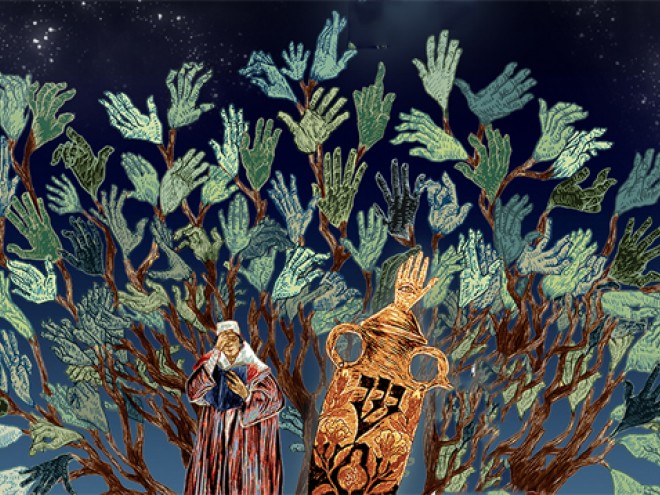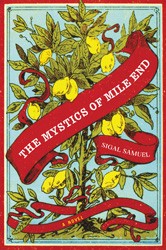Earlier this week, Sigal Samuel wrote about envisioning a mystical experience for the twenty-first century against the traditions of Kabbalah. She is blogging here all week as part of the Visiting Scribe series on The ProsenPeople.
It’s a strange irony that a scene I love but ultimately had to cut from my novel best explains why I wrote the novel in the first place.
I’ll share part of it with you here. In this deleted passage from The Mystics of Mile End, an elderly and very isolated European Jew is trying, and failing, to read Shakespeare:
More and more often, Glassman found himself appealing to the pleasure of carefully measured, beautifully proportioned words to stave off the specter of the old mistake that encroached on his mind when everyone else in the world was asleep. If only, if only he could understand! Because the words, beautiful as they were, were horribly confusing. Their meaning was gray and dim, like a dream that slipped away at the first signs of daylight. Glassman hated that night after night he kept brushing up against the limits of his own abilities. He wanted to understand. But he had no method, no system, and no teacher or friend who could help him push those limits further out.
After the war he’d simply read whatever chanced to come his way. As a result, the holes in his knowledge of history and philosophy and science, like the holes in his vocabulary, were fathomless and impossible to number. Making his way through a poem or a passage of prose was like hopping from slippery stone to slippery stone in order to cross a river: he sensed, could actually physically feel, that there were huge gaping swaths of meaning in between his solid points of reference, large marshy areas that he dare not step foot in, because who knew where they would lead, what they were made of, and whether he would ever find his way out again?
With a cautious toe, he felt around and sought out the words he knew. Sometimes these familiar words would come in clumps of eight or nine or ten, and when he reached one of these islands he would stand on it for a minute or more, frozen and grateful and breathless, before moving on. It was tempting to stay on these little islands forever, but he knew it was important to keep moving; if he stood in the midst of the same sentence for too long, it began to lose its shape, crumbling first into individual words and then into individual letters that broke apart beneath his feet and dissolved in the water around him. And this was a fearful thing, to be stranded inside a word, letters falling off on all sides, leaving the reader in empty space with nothing solid to cling to, sometimes, but a single vowel. And if this single vowel should then succeed in slipping from his grasp — then, then he was in trouble! Then there was nothing to anchor him in the blessed world of sound and, spinning off into silence, his body could easily come unstuck and fly apart from the thing that gave it life: the soul. To ensure safe passage through a stretch of language the reader had to race, and yet racing for pages and pages at a time, across increasingly sparse and slippery stones, was in itself exhausting and soul-crushing work.
You can probably see why this passage got cut, right? It doesn’t push the plot forward; the action is all internal. But I admit that it has a special place in my heart. It features a character who counts on language to keep him sane, who uses words’ concrete sounds to moor him when he’s adrift in silence — only to find that words themselves are not stable berths or quays or jetties; they’re constantly threatening to come apart. And if they come apart, you come apart, too.
I both relate and don’t relate to Glassman’s experience. Like my character, I read to keep body and soul together. But I write to make them fly apart.
And that flying-apart, when it’s intentionally provoked, is the best feeling I know. It’s what made me write this book in the first place.
I remember how and where I did it: night after night after night in a bleak university library. I was surrounded by unglamorous fluorescent lighting and student meal smells, an endless ramen haze. I always chose the same seat, facing a blank white wall. Every night I’d sit there for four hours, from 8:00, when I finished dinner, until midnight, when the janitor would shoo me out and lock up the building.
My goal in those hours was to put down 1000 words; good or bad, it didn’t matter. At first it was hard — painful — to make myself face the blank white of my computer screen. But after about twenty minutes of typing, something happened. It wasn’t just that I’d suddenly remember forgotten moments from childhood, or find myself hearing a character’s voice that others had warned me I wouldn’t be able to access; ideas would come flying out of my fingertips that I never knew I had in me.
 At the risk of sounding like one of my crazy, mysticism-obsessed characters, I’m just going to go ahead and say it: In those moments, the act of writing itself felt like a Kabbalistic practice.
At the risk of sounding like one of my crazy, mysticism-obsessed characters, I’m just going to go ahead and say it: In those moments, the act of writing itself felt like a Kabbalistic practice.
The medieval mystics’ meditations were nothing if not techniques for achieving altered states of consciousness. That’s exactly what writing fiction does for me. It alters my consciousness in a way that opens me up to something beyond myself. It allows some Other — call it a dybbuk, call it my subconscious — to temporarily inhabit my conscious mind and take over, producing things that are much better than anything I’d be able to produce if it were “just me” sitting there.
For this reason, writing fiction always feels to me like cheating. My dirty secret is that I feel I’m not a creator but a stenographer, a transcriptionist. But what can I do? It’s still the best feeling I know.
Sigal Samuel is an award-winning fiction writer, journalist, essayist, and playwright. Originally from Montreal, Sigal now lives and writes in Brooklyn. The Mystics of Mile End is her first novel.
Related Content:
- Essays on Outtakes, Revisions, and What’s Next
- Niles Goldstein: Plowing a “Gonzo” Road Through the Rabbinate
- Carla Naumburg: Learning the True Value of My Thoughts
Sigal Samuel is a Staff Writer for Vox’s “Future Perfect.” She writes about artificial intelligence, neuroscience, ethics, and the intersection of technology and religion. Previously, she was the Religion Editor at The Atlantic. Her award-winning journalism has also been published in outlets like BuzzFeed, The Daily Beast, The Rumpus, and Electric Literature. She has appeared on NPR, BBC, and CBC. Sigal’s novel, The Mystics of Mile End, tells the story of a dysfunctional family dealing with mysticism, madness, and mathematics in Montreal. It was nominated for the International Dublin Literary Award and won a Canadian Jewish Literary Award. Sigal earned her MFA in Creative Writing from the University of British Columbia and her BA in Philosophy from McGill University.



